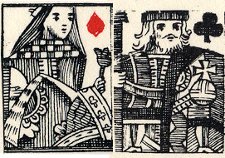South Sea Bubble
The South Sea Bubble Playing Cards were first published in London by Thomas Bowles in 1720. The cards bear satirical portrayals of the speculators involved in the South Sea Bubble of 1720, providing a unique contemporary record of the feverish atmosphere of the time, as well as the fashions of dress.
South Sea Bubble Playing Cards, 1720
The Original Stock Market Crash!

 he South Sea Bubble Playing Cards were first published in London by Thomas Bowles in 1720. The cards bear satirical portrayals of the speculators involved in various commercial projects started during the South Sea Bubble of 1720, providing a unique contemporary record of the feverish atmosphere of the time, as well as the fashions of dress.
he South Sea Bubble Playing Cards were first published in London by Thomas Bowles in 1720. The cards bear satirical portrayals of the speculators involved in various commercial projects started during the South Sea Bubble of 1720, providing a unique contemporary record of the feverish atmosphere of the time, as well as the fashions of dress.
The cards were printed from copper plates, with the red suit symbols being applied later by stencil. The court cards contain interesting miniature versions of the standard full-length figures used on playing cards at the time. The backs are plain. A modern facsimile of the pack is part of a range published by Harry Margary.

Above: cards from the facsimile edition courtesy Giles de Margary. Click image to zoom. The cards provide a unique contemporary record of the feverish activities of traders in stock, by depicting in cartoon form a series of domestic situations which, although doubtless somewhat exaggerated, represented the atmosphere of the time. Extensive use is made of the balloon technique for reporting the speech of those portrayed and each card has a pithy, not to say in several instances coarse, verse describing the situation. Packs can be ordered directly from www.harrymargary.com
Three of Hearts: A Venetian lady, owning a Dutch pack of cards satirising the notorious Bubble schemes of c1720, invited one of the worst financial miscreants to play cards. The first card he turned up was the Three of Hearts and he left immediately, deeply offended.

By Simon Wintle
Member since February 01, 1996
I am the founder of The World of Playing Cards (est. 1996), a website dedicated to the history, artistry and cultural significance of playing cards and tarot. Over the years I have researched various areas of the subject, acquired and traded collections and contributed as a committee member of the IPCS and graphics editor of The Playing-Card journal. Having lived in Chile, England, Wales, and now Spain, these experiences have shaped my work and passion for playing cards. Amongst my achievements is producing a limited-edition replica of a 17th-century English pack using woodblocks and stencils—a labour of love. Today, the World of Playing Cards is a global collaborative project, with my son Adam serving as the technical driving force behind its development. His innovative efforts have helped shape the site into the thriving hub it is today. You are warmly invited to become a contributor and share your enthusiasm.
Related Articles

Scientific Whist
“Scientific Whist” : standard cards with instructions for play on the faces by Chas Goodall & Son, 1...

Agent Provocateur
Branded lingerie collection in a pack of pin-up playing cards.

Nimbus playing cards
Mike Steer’s weather-themed pack with suits in four colours and backs for cardistry.

Caisse Mutuelle d'Assurance et de Prevoyance
Insurance propaganda pack for Caisse Mutuelle d'Assurance et de Prevoyance with humorous artwork by ...

Agatha Christie and Playing Cards revisited
Agatha Christie uses card-play as a primary focus of a story, and as a way of creating plots and mot...

The Decadent Deck
Studies in the eroticism of the female body by Inge Clayton.

Historic Shakespeare
“Historic Shakespeare” playing cards featuring Shakespearean characters by Chas Goodall & Son.

Copechat Paramount Sorting System
Preserving the past: a specimen deck showcasing edge-notched cards and their ingenious sorting syste...

Heartsette by Herbert Fitch & Co, 1893
A glimpse into a busy print and design office in late Victorian London.

Batman® playing cards
Batman playing cards published by InterCol of London 1989.

Can You Believe Your Eyes?
“Can You Believe Your Eyes?” playing cards featuring visual illusions & other oddities.

Pastime Playing Cards for the Blind
The “Pastime” Playing Cards for the Blind manufactured by Goodall & Son Limd., c.1910.

French Revolutionary cards by Pinaut
Seven cards from a French Revolutionary pack by Pinaut featuring characters from classical antiquity...

Songs with Flute accompaniment
Eighteenth century English engraved cards with music for voice and flute.

Love Tests
Vintage novelty “Love Test” cards of a slightly saucy nature but all in good fun!

Ben 10 playing cards
Characters from the American animated television science fantasy series Ben 10.
Most Popular
Our top articles from the past 28 days

